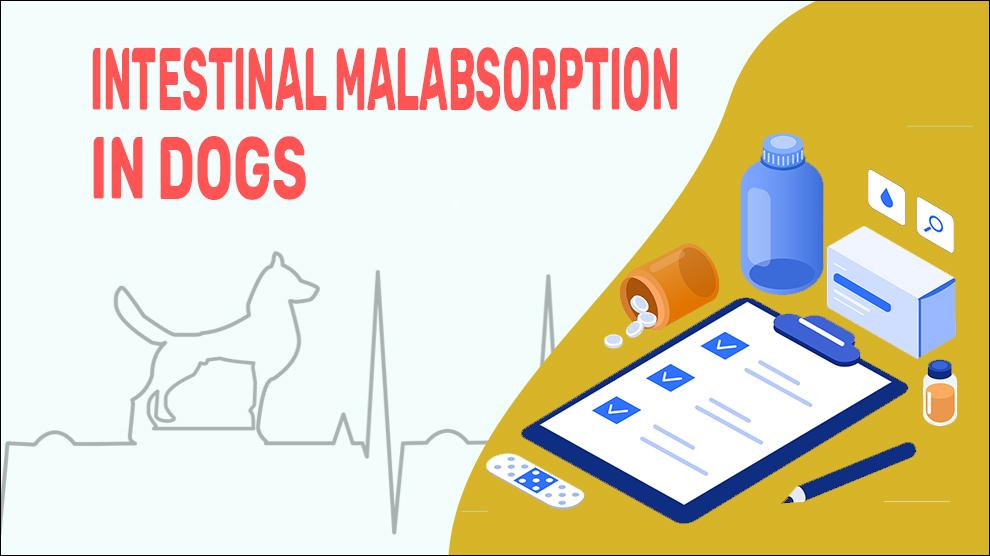What Is Intestinal Malabsorption In Dogs?
Intestinal Malabsorption in dogs is one of the most multifaceted clinical conditions to diagnose as the causes of Intestinal Malabsorption is diverse. Despite a good appetite, Intestinal Malabsorption is the inability or deficiency within the dog’s system to absorb nutrients from the food they consume resulting in malnourishment.
Simply, Intestinal Malabsorption can arise from any failure in the digestion/absorption process. When not treated properly, Intestinal Malabsorption can affect growth and development as well as it can lead to fatal consequences.
Maldigestion refers to the impaired breakdown of nutrients whereas Intestinal Malabsorption refers to impaired absorption of nutrients. Intestinal Malabsorption and maldigestion are pathophysiologically different; however, digestion and absorption are inter-reliant. As a result, much in literature, the term “Intestinal Malabsorption” refers to either procedure of this interdependence.
Symptoms Of Intestinal Malabsorption In Dogs
- Eating unusual things such as trash.
- Early satiety- Eating less food than normal.
- Lack of interest or refusing to eat food and/or treats.
- Hungry, trying to eat but unable to eat.
- Weight loss despite insatiable appetite.
- Weakness/lethargy
- Vomiting
- Noisy stomach with rumbling and gurgling sounds.
- Flatulence
- Shabby and scruffy hair coat
- Chronic diarrhea
Treatment Options For Intestinal Malabsorption In Dogs
Depending on the underlying cause, vets may recommend one or a combination of these treatments:
Special Treatments:
- Treatment of diseases of infectious origin: Antibiotics, antivirals, antiparasitics, etc.
- Treatment of diseases of tumor origin: Surgery, chemotherapy.
- Treatment of inflammatory or immune-mediated diseases: Immunosuppressive drugs.
- Treatment of pancreatic insufficiency: Pancreatic enzymes administration.
Supportive treatments:
Diuretics:Loop diuretic (Furosemide, Torsemide).
Thoracentesis: Removal of fluid from pleura- the space between the lining of the outside of the lungs.
Fluid Therapy: To treat dehydration.
Anticoagulants: Aspirin or clopidrogel.
Vitamin B12 or folate supplementation.
Home Remedies For Intestinal Malabsorption In Dogs
- Follow your veterinarian’s guidelines for treatment and give the medications exactly as prescribed.
- Follow-up exams will need to be scheduled to make sure that all of the condition has been eliminated.
- Your veterinarian can prescribe the proper food regimen required to keep your pet as healthy as possible.
Prevention Of Intestinal Malabsorption In Dogs
There is no way to prevent Intestinal Malabsorption. Inculcating a healthy routine from the start is a good way of prevention.
Amongst the list of challenges most dog owners expect to encounter, the Intestinal Malabsorption condition will be the least expected but it actually plagues a surprisingly high number of animals.
In addition, diagnosing Intestinal Malabsorption in a dog comes with an added caveat: the tougher part is the identification of the cause whether it is behavioral, medical, or nutritional.
Affected Dog Breeds Of Intestinal Malabsorption
German Shepherd, Shar Pei
Additional Facts For Intestinal Malabsorption In Dogs
Causes:
- Inflammatory bowel disease
- Exocrine pancreatic insufficiency
- Infectious agents such as viral and fungal infections or parasites
- Idiopathic villous atrophy within the small intestine
- Obstruction or blockages involving the lymphatic system of the gastrointestinal tract
- Dietary causes such as food sensitivity
- Small intestinal bacterial overgrowth
- Bacterial overgrowth in the intestines such as SIBO
Types:
Nutrient Absorption Stages: Luminal (pre mucosal or digestive), mucosal (absorptive), postabsorptive (post mucosal/ transport phase).
Intestinal Malabsorption can be categorized according to the stage it is affected.
- The Luminal Phase: Proteins, carbohydrates, and dietary fats are hydrolyzed and mechanical by mixing with digestive enzymes and bile.
- The Mucosal Phase: Proper functioning of the brush-border membrane of intestinal epithelial cells is required to transport digested contents to the cells.
- The Postabsorptive Phase: This phase starts after the absorption and transport of nutrients is facilitated by an intact blood supply and lymphatic system.
Morbidity:
Fat Malabsorption: Most common the intestinal malabsorption condition.
Carbohydrate Malabsorption: Starch, monosaccharides (glucose, fructose, galactose), and disaccharides (sucrose, maltose, lactose).
Protein Malabsorption: Impaired absorption of Protein.
Vitamin, Mineral, and Trace Element Malabsorption: Several intestinal transport mechanisms carry out the absorption of minerals, vitamins, and trace elements. Impaired or abnormal functioning at any one of these levels results in intestinal malabsorption.
Diagnosis:
- Blood test - Hypoproteinemia, Hypocholesterolemia, Anemia, Hypocalcaemiaetc
- Abdominal ultrasound
- Fecal cultures
- Biopsies such as full-thickness bowel biopsies
Mortality:
Intestinal Malabsorption refers to a number of disorders that can cause impaired absorption in the small intestine. Infections such as Bacterial overgrowth or dietary causes such as food sensitivity are not usually serious. There are other serious causes that result in Persistent diarrhea /dehydration and that are potentially life-threatening.
Prognosis:
The intestinal malabsorption prognosis will depend on the condition that has given rise to the problem. Thus, for exocrine pancreatic insufficiency, the outcome is good. Obstruction or blockages involving the lymphatic system of the gastrointestinal tract requires lifelong management and the prognosis is guarded.
When To See A Vet For Intestinal Malabsorption In Dogs?
Contact your vet right away, if you notice any of the following:
- Persistent diarrhea/dehydration
- Weight loss despite insatiable appetite
Food Suggestions For Intestinal Malabsorption In Dogs
Nutritional Management:
High-protein, high-calorie, low-fiber, moderate-fat diet with Calcium, magnesium, and vitamin A, D, E, and K supplementation.
- Carbs: lactose and gluten-free
- Prebiotics (eg, fructooligosaccharides) and probiotics
- Omega - 3’s
- Commercial protein hydrolysates( for inflammatory enteropathies)
- Cobalamin and folate supplementation
Conclusion
The prognosis for dogs with Intestinal Malabsorption depends upon the specific diagnosis, as well as the dog's health condition at the time of diagnosis.
If the underlying cause of Intestinal Malabsorption is diagnosed early and the dog is in relatively good health, effective treatment for the underlying illness will result in a good prognosis.
Sadly, certain Intestinal Malabsorption causes that indicate your dog is suffering from a very serious or life-threatening condition (such as cancer, toxins, autoimmune conditions, or severe trauma) have a less favorable prognosis but still, it is manageable.

















